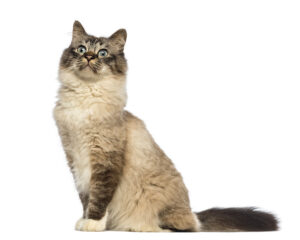
Cats are prone to poor diets and ultimately obesity. Consider these cat nutrition tips when deciding how best to feed them.
Feeding a cat is often more of an art than a science. With cats, it can be difficult at first to determine the right amount of food and what kind of food to feed to keep your cat in optimal health well into their later years. There are guidelines that can help get you started, but the determining factor in your cat’s diet will typically be their preferences and activity levels.
Adult Cats
A critical component of every cat’s diet is taurine, which is only found in animal protein. A meat-based diet is critical for a cat’s health.
According to the ASPCA, the recommended feeding method for cats is to give them two meals a day that are 8-12 hours apart. It is recommended that you use the guidelines that come with their food to determine their daily recommended intake, then simply half it so you have two meals for the day. For anyone who cannot manage this kind of schedule, timed feeding or free feeding are also options. Timed feeding is done by setting out your cat’s meal and leaving it for a set amount of time (usually around 30 minutes). After the time has passed, pick up whatever food hasn’t been eaten. Free feeding, on the other hand, is an option mainly reserved for dry food where it is left out indefinitely, and the cat is able to eat at its leisure. This can work for some cats but often leads to overeating and obesity. Any cat being free-fed should be watched closely to ensure they are not gaining too much weight.
Obesity
If your cat gains too much weight and becomes overweight or obese, it’s better to do something about it sooner rather than later. Obesity leads to health problems in our pets, just like it does in humans, and should be carefully monitored and mitigated as much as possible.
If you notice your cat is gaining more weight than normal, consider cutting back their food intake and finding ways to get them to be more active. It’s always a good idea to consult with your veterinarian to make a plan if you’re not sure where to start or are worried about overcorrecting. They can help you find weight management foods and offer advice on activities and feeding schedules that will work well for you and your cat so you can help them lose weight comfortably.
Senior Cats
According to the ASPCA, cats should be switched to a senior diet starting around 7 years of age. Generally, their feeding regimen should remain the same otherwise unless it needs to be adjusted due to illness or disease, as recommended by your veterinarian. As your cat ages, they will become less active, so it’s important to watch for signs of weight gain and ensure that they aren’t being overfed in relation to their activity level.
Trust Maryland Veterinary Surgical Services With Your Companion’s Health
Your companion’s health is important, and the team at MVSS is ready to provide the best care possible for your furry family. We are dedicated to combining comprehensive exams and assessments with informative and honest discussions of your companion’s care. Once we have worked with you to decide on the best course of action for your dog, our professionals will use their surgical expertise to work towards the goal of giving your companion an active and pain-free life. We are proud to serve loyal companions in Catonsville and Baltimore. To learn more about our services, give us a call at 410-788-4088 or visit us online. For more information and tips for pet health, follow us on Facebook and Pinterest.
